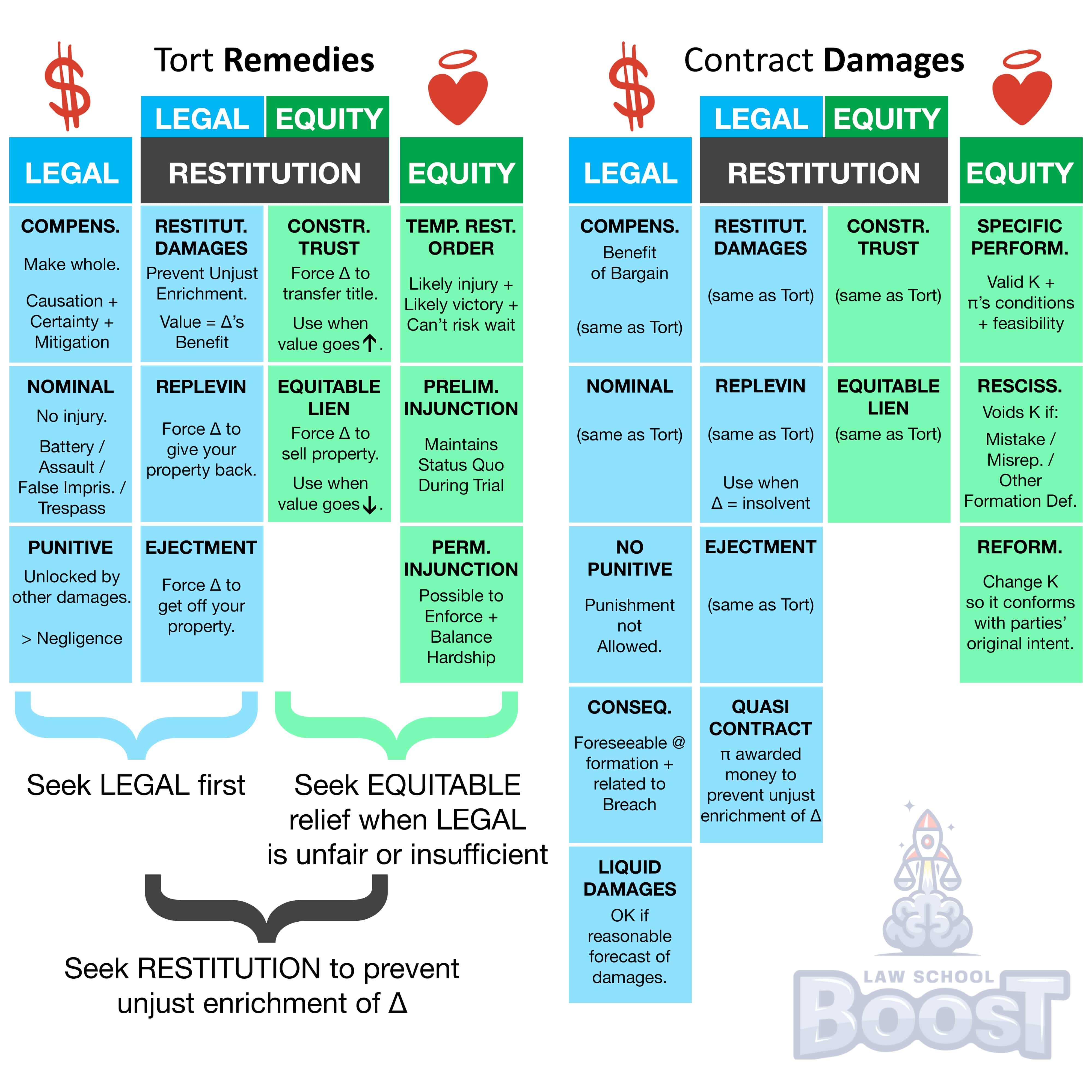🏥
Remedies • Tort - Equitable Remedies
REM#031
Legal Definition
Unclean hands is an available defense only where a plaintiff's alleged improper, unethical, or bad faith conduct is related to the lawsuit. It is not enough that the plaintiff is a bad person in general.
Plain English Explanation
When someone is being sued and they want the court to stop the other person from doing something (this is called "injunctive relief"), they can use the unclean hands defense. This defense means that the person suing has also done something wrong, but it has to be related to the reason they're suing. Just because the person suing has done bad things in the past doesn't mean they can't sue for something unrelated. The purpose of this rule is to make sure that someone can't benefit from their own wrongdoing in a lawsuit. It exists to promote fairness in the legal system.
In other words, courts don't like hypocrites.
In other words, courts don't like hypocrites.
Hypothetical
Hypo 1: Bob runs a business selling organic vegetables. Sam buys from Bob but finds out that Bob has been secretly using non-organic pesticides. Sam sues Bob for false advertising and asks the court to stop Bob from selling vegetables labeled as organic. Bob argues that Sam knew about the pesticides all along and even encouraged Bob to use them to cut costs. Result: The court might apply the unclean hands defense and refuse to grant Sam the injunction because Sam's encouragement of the pesticide use is directly related to the lawsuit's subject matter.
Hypo 2: Sam hires Bob to build a fence on her property. Bob does a poor job, and the fence is unstable. Sam sues Bob for the cost of repairs and asks the court to prevent Bob from building any more fences. Bob argues that Sam provided him with faulty materials on purpose to later sue him. Result: If the court finds that Sam indeed provided the faulty materials, they may refuse to grant the injunction due to Sam's unclean hands in the very transaction at issue.
Hypo 3: Bob and Sam are neighbors. Bob builds a shed that slightly encroaches on Sam’s property. Sam sues to have the shed removed and seeks an injunction. Bob argues that Sam had previously extended her garden into Bob’s property without permission. Result: The court would likely not apply the unclean hands defense here because Sam’s previous garden encroachment is not directly related to the issue of Bob’s shed. Therefore, the injunction might still be granted.
Hypo 4: Bob sues Sam for defamation after Sam spreads rumors about Bob’s shady business dealings. Sam argues that Bob has been spreading false rumors about her business for years. Result: If Sam’s defamation claims are directly related to the defamation she is being sued for, the court may apply the unclean hands defense and refuse to grant Bob the relief he seeks.
Hypo 2: Sam hires Bob to build a fence on her property. Bob does a poor job, and the fence is unstable. Sam sues Bob for the cost of repairs and asks the court to prevent Bob from building any more fences. Bob argues that Sam provided him with faulty materials on purpose to later sue him. Result: If the court finds that Sam indeed provided the faulty materials, they may refuse to grant the injunction due to Sam's unclean hands in the very transaction at issue.
Hypo 3: Bob and Sam are neighbors. Bob builds a shed that slightly encroaches on Sam’s property. Sam sues to have the shed removed and seeks an injunction. Bob argues that Sam had previously extended her garden into Bob’s property without permission. Result: The court would likely not apply the unclean hands defense here because Sam’s previous garden encroachment is not directly related to the issue of Bob’s shed. Therefore, the injunction might still be granted.
Hypo 4: Bob sues Sam for defamation after Sam spreads rumors about Bob’s shady business dealings. Sam argues that Bob has been spreading false rumors about her business for years. Result: If Sam’s defamation claims are directly related to the defamation she is being sued for, the court may apply the unclean hands defense and refuse to grant Bob the relief he seeks.
Visual Aids

Related Concepts
What are equitable remedies in tort?
What are the defenses to a suit seeking injunctive relief?
What is a preliminary injunction and how is it issued?
What is a temporary restraining order ("TRO") and what is required to get one?
What is contempt?
What is the collateral bar rule?
What parties are bound by an injunction?
When assessing a permanent injunction, how do courts balance hardships?
When assessing defenses to a lawsuit seeking injunctive relief, when is impossibility applicable?
When assessing defenses to a lawsuit seeking injunctive relief, when is laches applicable?
When deciding on a permanent injunction, when may ejectment be inadequate?
When deciding on applying a permanent injunction, when may money damages be inadequate?
When may replevin be inadequate as a remedy and, instead, a court will opt for a permanent injunction?
When will a court issue a permanent injunction?


